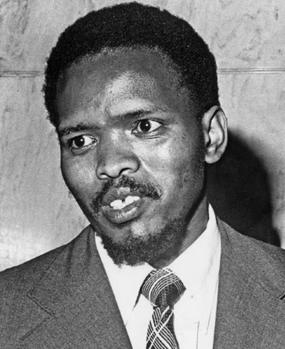Steve Biko
 On 12 September 1977, South African anti-apartheid activist Steve Biko died as a consequence of state violence following his arrest. Ideologically an African nationalist and African socialist, he was at the forefront of a grassroots anti-apartheid campaign known as the Black Consciousness Movement during the late 1960s and 1970s. His ideas were articulated in a series of articles published under the pseudonym Frank Talk.
On 12 September 1977, South African anti-apartheid activist Steve Biko died as a consequence of state violence following his arrest. Ideologically an African nationalist and African socialist, he was at the forefront of a grassroots anti-apartheid campaign known as the Black Consciousness Movement during the late 1960s and 1970s. His ideas were articulated in a series of articles published under the pseudonym Frank Talk.
The government came to see Biko as a subversive threat and placed him under a banning order in 1973, severely restricting his activities. During his ban he received repeated anonymous threats, and was detained by state security services on several occasions. Following his arrest in August 1977, Biko was beaten to death by state security officers.
News of Biko's death spread quickly across the world, and became symbolic of the abuses of the apartheid system. His death attracted more global attention than he had ever attained during his lifetime. Protest meetings were held in several cities, as many were shocked that the security authorities would kill such a prominent dissident leader. Over 20,000 people attended his funeral.
(Source: Wikipedia accessed on 11 September, 2024)
Selected Publications
Attenborough, Richard, Richard Attenborough’s Cry freedom: a pictorial record (London, 1987).
Biko, Nkosinathi, Steve Bantu Biko: beacon of hope : a documentary (1999).
Biko, Steve, en Aelred Stubbs, I write what I like (London, 1978).
Biko, Steve, en Millard Arnold, Black consciousness in South Africa (New York, 1979).
Biko, Steve, en Millard Arnold, The testimony of Steve Biko (London,1979).
Briley, John, Cry freedom: a novel (New York, 1987).
Mangcu, Xolela, Biko: a life (London, 2014).
Maruma, Olley Tsino, Mark Kaplan en Mike Munyati, Breaking the silence: Biko (1987).
Mbabane, James, Steve Biko: martelaar van de revolutie (Johannesburg, 1978).
Woods, Donald, Biko (New York, 1987).
Wyck, Chris van, We write what we like (Johannesburg, 2007).

